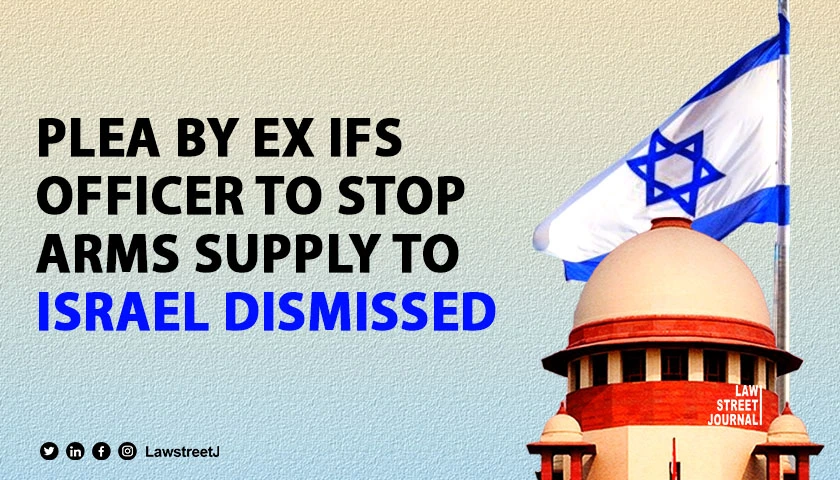NEW DELHI: The Supreme Court on Monday dismissed a plea filed by a group of activists, including former IFS officers, in the Supreme Court for a direction to the Union government to cancel existing licences of companies supplying military arms and ammunition to Israel during its war in Gaza.
A bench of Chief Justice of India D Y Chandrachud and Justices J B Pardiwala and Manoj Misra said the issue was in the domain of foreign policy and beyond the jurisdiction of this court to direct the Union government to stop export materials to any country.
The court also cited Article 162 of the Constitution to point out the authority and jurisdiction are vested in the Union government for the engagement in foreign affairs.
After hearing advocate Prashant Bhushan for the petitioners, the bench asked how the court can adopt this kind of jurisdiction.
"We can't tell the government that you shall not export to a particular country or cancel the licenses of companies exporting arms to that country. It is a matter of foreign policy which is to be handled by the government," the bench said.
The bench wondered how the court can tell the government that there should not be exports of arms to a country.
"Where does the court get that sort of power? National self-interest has to be evaluated by the government," the bench observed.
Bhushan contended the court can intervene if the policy was against the Constitution and law.
The bench again wondered if the court can direct the government to stop the import of oil from Russia in the ongoing war between Russia and Ukraine.
The court pointed out in case of Bangladesh too, there are disturbances there, as to what should be the degree of economic engagement with that country, it is a matter of foreign policy. In Maldives also we had some issues. Can we then ask the Government to ask to stop investments there, it said.
Bhushan said many international bodies have found that they are committing genocide.
He also said cited example of Spain which stopped an Indian ship and the UK government which suspended exports to Israel. The court, however, said it was done by the UK government and not its Supreme Court.
The bench also said any order by the apex court might create problem for the Indian companies which entered into contracts.
The writ petition filed through advocate Bhushan alleged violations of international laws and the Constitution in supply of arms to India through public sector Munitions India, and private companies such as M/s Premier Explosive and Adani Defence and Aeropace Ltd.
The petitioners led by retired IFS officer, Ashok Kumar Sharma alleged violation of India’s obligations under international law coupled with Articles 14 and 21 of the Constitution.
The petition has been filed jointly by Meena Gupta, Deb Mukharji, Achin Vanaik, Jean Dreze, Thodur Madabusi Krishna, Harsh Mander, Nikhil Dey and others.
They cited a recent January 26, 2024 decision by the International Court of Justice (ICJ) which ordered provisional measures against Israel for violations in the Gaza Strip of obligations under the Convention on the Prevention and Punishment of the Crime of Genocide.
The provisional measures included immediate military halt to all killings and destruction that is being perpetrated by Israel on the Palestinian people.
The plea claimed in supplying arms to the State of Israel, through Munitions India, a public sector undertaking, and granting licences to others for the same purpose, the Union government has breached and continues to breach its obligations under international law with full knowledge of the situation, failing to prevent the ongoing genocide against the Palestinian People in particular Gazans and by not only failing to prevent the ongoing genocide but by providing aid, including military equipment, to Israel that would be used in the commission of genocide.
The plea also said the ICJ in July, 2024 noted that the sustained abuse by Israel of its position as an occupying power, through the use of disproportionate violence on the Palestinian people, violated fundamental principles of international law and renders Israel’s presence in the occupied territory unlawful.
It contended India is bound by various international laws and treaties that obligated not to supply military weapons to States guilty of war crimes, as any export could be used in serious violations of international humanitarian law.
The plea stated in various judgments, this court has held that India is under an obligation to interpret domestic law in the light of the obligations under the conventions and treaties that India has both signed and ratified.
"India is obligated under the Genocide Convention (which India has signed and ratified) to take all measures within its power to prevent genocide. India therefore cannot export any military equipment or weapons to Israel when there is a serious risk these weapons might be used to commit war crimes," the plea said.
The continued supply of arms is in violation India’s obligations under international law coupled with Articles 14 and 21 read with 51(c) of the Constitution, it said.

















